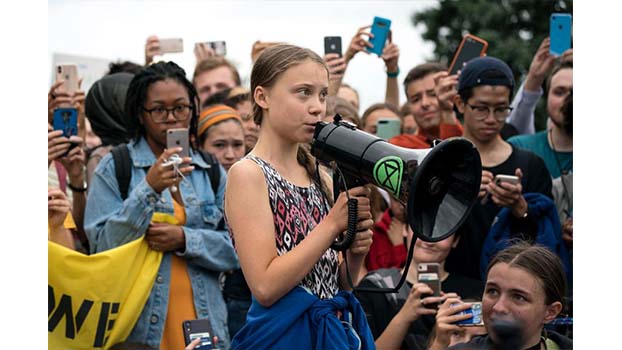Does Greta Thunberg’s lifestyle equal climate denial?

The climate debate has taken a nasty turn. It is no longer a shouting match between climate affirmers and climate deniers. Now the finger-wagging is taking place among climate affirmers on the subject of personal responsibility for combating climate change.
There are two key actors in this unfolding saga. One embraces the importance of individual responsibility while the other derides it.
Greta Thunberg, the new climate icon, does not fly. She is a vegan and subscribes to the stop-shop philosophy, which means that “you don’t buy new things, consume new things, unless you absolutely have to.” In a recent interview, Greta said, "I want to walk the talk, and to practice as I preach. So that is what I'm trying to do."
In contrast, Michael Mann, a prominent climate scientist, suggests that any talk of behavioral changes and personal responsibility reflects a soft form of climate denial. Although he did not mention Greta by name, he said: “First of all, there is an attempt being made by them to deflect attention away from finding policy solutions to global warming towards promoting individual behaviour changes that affect people’s diets, travel choices and other personal behaviour…. This approach is a softer form of denial and in many ways it is more pernicious.”
Thunberg v. Mann is now the debate to watch!
Mann’s thesis: The case against personal responsibility
Climate change is a complex problem because it involves moving away from the basic pillar of the modern industrial economy: fossil fuels. The shift requires that governments enact new climate laws and build a renewable energy infrastructure.
Because these are massive, system-wide changes, individual-level actions to become climate virtuous will not suffice. We can buy electric cars, but without charging stations, they are quite useless. And a national network of charging stations can be provided only by the government.
But, as per Mann’s thesis, individual-level actions delay the transition because they allow the fossil fuel industry to blame consumers for the climate crisis. The industry will claim that they are in business because people like their modern lifestyles. For example, people like driving cars: there are over a billion cars in the world today. And as the recent International Energy Agency’s report shows, consumers seem to want bigger and less fuel-efficient cars.
Contrary to the industry claim, the Mann thesis would suggest that people drive cars because governments do not invest in mass transit. People are trapped in their behaviors because of bad public policies, not personal choices.
Thunberg’s thesis: The case for personal responsibility
Climate change is a symptom of overconsumption. If we want to address the climate crisis, we need to demand policy action and change our consumption habits. This is why Greta, the climate activist, does not fly, is a vegan, and adopts a stop-shop philosophy.
But the Greta approach is sending a more profound message: policy advocacy is effective if one walks the climate talk. This is especially relevant for climate scientists who know the seriousness of the climate crisis. Across universities, there is widespread support for Climate Strikes and the Extinction Rebellion. The issue then is how have universities changed their work habits. Have they put themselves on a strict carbon diet?
In spite of federal inaction, states and cities are moving ahead on climate action. Should then universities and individuals not follow the same approach?
The challenge for climate
scientists
If climate scientists want to enhance the credibility of their message, they should probably follow Greta’s example of walking the climate talk. Scientists make a very persuasive case for phasing out fossil fuels. But, these policies impose pain on coal-miners, Teamsters, farmers, and blue-collar workers, who are already facing enormous economic hardships.
The transition to the low carbon economy needs legitimacy. For this, all must share the pain. Are climate scientists sharing this pain and communicating solidarity with the farmer and the blue-collar worker?
We don’t think so. One way to share the pain is to reduce air travel: a visible example of an elite lifestyle and carbon pollution.
For reference, 12 percent of Americans account for 66 percent of air travel. Have eminent scholars who serve on various IPCC expert committees cut down on their professional travel?
What about the morality (and also the optics) of the “climate conference tourism,” where professors take their students to foreign locations for a couple of days to attend events such as the Conference of Parties. Some might argue that these conferences provide a unique perspective to students. Might students gleam the same knowledge about climate change from podcasts or other resources without creating a huge carbon footprint?
Behavioral changes enhance the credibility of the message
The climate message cannot be separated from the messenger, especially given the political polarization over the issue. Consider the example of Gandhi who saw self-sufficiency and simple living to be necessary for India’s economic independence from Britain. He practiced what he preached and insisted that his followers do the same. Gandhi wearing an Armani suit and driving in a Rolls Royce, would not be a credible spokesperson for simple living. And under Gandhi’s leadership, India continued to fight for its independence. The behavioral choices of Gandhi’s followers did not dampen their policy advocacy.
Greta embraces a low-carbon lifestyle and demands policy changes. Fossil-fuel interests have not captured her; watch her very brief testimony to the US Congress, where she asked the Congress to enact policies based on the IPCC report.
The bottom line is that when people take personal responsibility, they begin to have skin in the game. Climate action becomes personal and it makes them more politically assertive in demanding policy changes. Instead of pointing fingers at individuals who walk the climate talk, climate scientists should start doing it themselves.
Nives Dolsak is Professor and Director of the School of Marine & Environmental Affairs
Aseem Prakash is the Walker Family Professor and the Director of the Center for Environmental Politics
Source: Forbes



